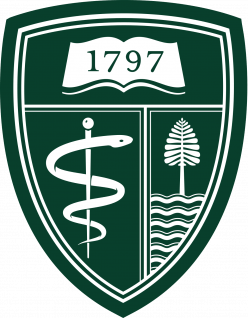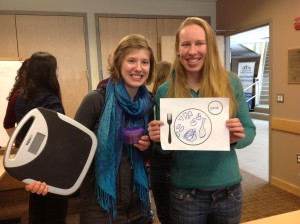Last weekend, Kelly and I went with a group of Geisel students, led by first years Xing Li and April Venn, to Burlington, VT to host an interactive nutrition talk for a small group of patients. The discussion was held at The Community Health Center of Burlington. http://www.chcb.org/about/about-chcb This is a Federally Qualified Health Center (FQHC) that provides primary care to all patients, regardless of whether or not they can pay – they receive federal grant money (and lots of donations) in order to support their mission of not turning away patients despite low incomes or lack of insurance.
During our nutrition talk, we spoke with 10 patients. The patients were ethnic Nepali Bhutanese refugees who had resettled in Burlington. Some have been living in the states for 3 years, some a few months. We had an interactive slide show explaining what carbs, fats, and proteins were. We had them draw on paper what a typical meal/ plate looks like for them. And despite lacking drawing skills, I too joined in and drew an example of “My Plate.” My favorite part though was getting to learn from the patients. It turns out, ironically, that the patients we were teaching nutrition to had healthier diets than Kelly and I did! And despite limited financial resources, when it came time for my Q&A session with them, I learned that buying and cooking healthy ethnic Nepalese food was a huge priority. We talked about where they shopped for groceries and how much they spent on food (see our powerpoint link below). What I learned is that apart from being unwilling to decrease their white rice portions, they could have been leading the talk. And I can’t blame them – I’ve lived off rice and beans for 7 weeks before and gained weight – white rice is yummy, not filling, and one can easily eat an entire plate or two in one sitting! They told us how they thought “American food” (they were referring to the processed foods in our presentation) was too salty and too sweet. And I couldn’t help but think; maybe these patients should come to Hanover and give our class a talk on how to cook healthy Nepalese food? During finals I am guilty of often choosing the “too salty/ sweet American food” options.
The more they talked about their food choices, the more questions I had for them. But I tried to respect their time and keep my portion of the talk under 5-10 min. I am always interested in learning what truly makes certain cultures tick. I love learning why American patients make the choices they do, or why they can’t make the choices they want to. It’s interesting (and important) to think: “Why do some of our Burlington Refugee Clinic Saturday patient groups value healthy ethnic food from their country and make it a priority to continue to do the best they can with the grocery stores and money they have? But then other Burlington Refugee patient populations we meet on Saturdays find American processed food more enticing and quickly gain weight, develop diabetes and hypertension and other comorbidities as soon as they move to Burlington? I wondered if some had worse refugee camp experiences and food shortages than others? After all when you go from food insecure to having cheap yummy off-brand Cinnamon Toast Crunch (one of my personal favorites) at your fingertips, how can you possibly stop at one bowl, or stop at one slice of cheap pizza, etc.? But maybe the different choices don’t necessarily stem from different past food security situations; maybe they stem from different cultural camaraderie, different peer-supported values, different evening schedules and time allowed for food preparation now that they’re living in Burlington, different children-parent influences (how many times did we as children watch commercials with Ronald McDonald on it and beg our parents to go buy us a cheap cheeseburger?). We had a great talk with John, the individual who runs the program at The Community Health Center, after the nutrition interaction session and he pondered the same thing. So my proposal to GHS and other Geisel students is that one of our future projects should be to go to Saturday Burlington Refugee Clinic talks, not to teach, but to learn. To learn why different patient populations are making the choices they are. To learn how to utilize what patients from these sessions are telling us now so we can better communicate nutritional advice to future patient populations we work with, no matter what their cultural preferences, past experiences, current views, or resource capabilities may be.
After the clinic discussion, we had the benefit of getting to stop and walk around downtown Burlington before heading back to Hanover. While exploring the shops, I discovered Ten Thousand Villages just opened a store in the pedestrian mall. So of course I had to stop in and consider buying a scarf I didn’t need! The thing I love about this shop is that it employs individual families, women, communities, etc. to produces beautiful works of art, clothes, yummy coffee and espresso beans, all from the prospective of their own culture.
They’re given a fair wage for each scarf, purse, teacup, vase, statue, that they make. And in turn, it prevents them from having to work in conditions of a nearby sweatshop or from having to rely on unsustainable handouts from visiting American NGO’s. Sure, in a way they are reliant on someone – because Ten Thousand Villages needs to pick up, transport their product, and sell it in The States. But they are given the dignity of knowing they’re earning the money they receive and knowing that somewhere someone else is enjoying and appreciating the beautiful art of a scarf they made. In a way all of us (medical students) will be dependent on patients for our future business to work. But the difference between working for a fair wage and relying on customers to pay that fair wage vs. relying on intermittent handouts is we can leave the hospital each night with dignity. Why? Because we will leave each night having provided something (medical care) for someone else and in turn, economically, will receive a fair wage to meet our own needs. So we get two gifts – the gift of feeling needed for our talent (whether that talent be making beautiful scarves and pottery or delivering medical care) and the gift of providing for ourselves with a paycheck.
When talking about global health and marginalized patient populations, I often hear the “Starfish Poem” referenced. In fact, I’ve even referenced it a few times myself. However, I wonder if we shouldn’t rethink what it takes to really make sure that when we are “throwing the starfish back in” it makes it deep enough into the ocean to not get washed back ashore. For my analogy: maybe traveling to Haiti and giving out $20 to a hungry kid begging outside a tent city would be throwing the starfish into shallow water. You can maybe think to yourself for that day “well, at least I helped that one.” But then later, when you’re not looking, the tide goes out and the starfish is left ashore again. And maybe employing women to make beautiful scarves they can be proud of and make enough money to keep feeding their families – that might be throwing the starfish into deeper water. Water deep enough that if a woman’s kid would get sick, she would have more than a one-time $20 hand out and could afford to take them to the local clinic. Water deep enough that the starfish wouldn’t just get washed right back up to the shore…
And the personal benefit of helping ethically sound companies, to throw a starfish back into the deeper waters? As a late-night studier and tired medical student, I selfishly admit that I am so happy to have the yummy coffee and espresso beans I purchased, sitting in my cozy Vermont kitchen.
STARFISH POEM
One day an old man was walking down the beach just before dawn. In the distance he saw a young man picking up stranded starfish and throwing them back into the sea. As the old man approached the young man, he asked, “Why do you spend so much energy doing what seems to be a waste of time?” The young man explained that the stranded starfish would die if left in the morning sun. The old man exclaimed, “But there must be thousands of starfish. How can your efforts make any difference?” The young man looked down at the starfish in his hand and as he threw it to safety in the sea, he said,” It makes a difference to this one!”
In summary, I did not leave Burlington last weekend empty handed. I learned that sometimes my patients might be healthier than me. I learned that each group of marginalized patient populations I will work with in the future will come to my clinic office with different food values, resource availability, knowledge, priorities, and willingness and abilities to adapt to my recommendations. I learned there are different ways to help throw starfish back into the ocean (some more sustainable than others). And, not to be forgotten, I now have a nice stock of espresso and coffee to get me through next finals. All in all, a win-win of a Saturday from a learner perspective…
Kristen M. Jogerst ’16
Geisel Global Health Scholar




